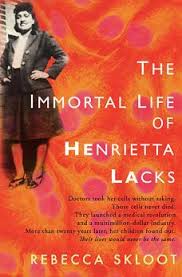 ‘s discussion on ethics was a great reminder (we can never be reminded too much) that research comes with tremendous responsibility. The readings as well as our discussion addressed issues of fabrication, ownership of data, power structures and speaking for others.
‘s discussion on ethics was a great reminder (we can never be reminded too much) that research comes with tremendous responsibility. The readings as well as our discussion addressed issues of fabrication, ownership of data, power structures and speaking for others.
I realize that I briefly mentioned this book before but I was recently reminded of it at a Toastmasters meeting and then during our ethics discussion. I think it’s relevant to this week’s topic in several ways… The Immortal Life of Henrietta Lacks is about a woman whose cancerous cells were taken without her or her family’s permission in 1951 at John Hopkins University during a time when patient consent was tenuous. Henrietta Lacks’ cells were the first to indefinitely thrive in culture. HeLa cells led to many medical breakthroughs, including the polio vaccine as well as advances in cancer, Parkinson’s disease, AIDS and much more. Though the HeLa cells spurred billions of dollar in pharmaceutical profit, the Lacks children had no idea of their mother’s contributions to modern science. In fact, many of them suffered from health ailments such as blindness, heart disease and diabetes but were too poor to receive proper care.
Bringing this all back to ethics…The writer, Rebecca Skloot, is a brilliant qualitative researcher who put people first and her project second. She employed  archival, ethnographic and intensive interview techniques in order to weave together Henrietta Lacks’ biography, the scientific history of HeLa production (interestingly, the HeLa saga also has roots to Tuskegee University); legal and ethical ramifications; along with the impact on the remaining members of the Lacks family.
archival, ethnographic and intensive interview techniques in order to weave together Henrietta Lacks’ biography, the scientific history of HeLa production (interestingly, the HeLa saga also has roots to Tuskegee University); legal and ethical ramifications; along with the impact on the remaining members of the Lacks family.
Skloot spent 10 years tracing the story. All the while, she treated the family with the respect that they deserved. The Lacks profess that Skloot became a part of their family. I got a chance to see the Lacks family speak at a conference; they continue to have a great relationship with Skloot. The book was also the selection for our campuswide common reading initiative at the small college where I worked. The undergrads enjoyed it…or so they said! At any rate, there was so much room for the endeavor to go wrong, but I believe that Skloot’s work is an example of activist scholarship. All of this ties back to beneficence being fundamental to research.